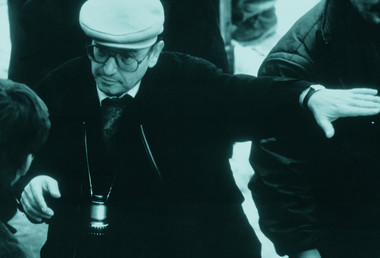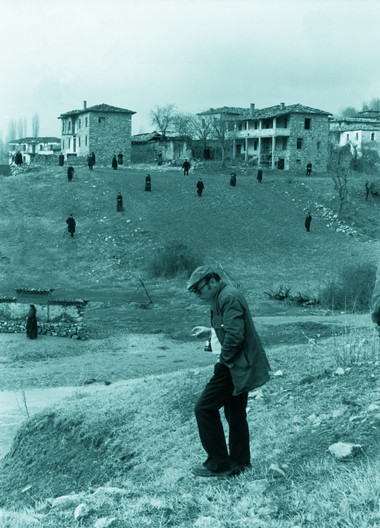Alexander the Great
One of the masterpieces by Theo Angelopoulos, a cinematographically refined story about the half-legendary leader of a guerrilla group, who established a small state in the Macedonian mountains at the beginning of the 20th century. His power came from the powerlessness of the authorities, who tolerated the satrap, because he held several English lords hostage. Megalexandros created the first communist utopia, he inspired European anarchists, liquidated private ownership and implemented equal rights for men and women. However, gradually his power changed into a dictatorship with the leading role of security apparatus, censorship and repressions against those who opposed the tyrant.
Alexander the Great became one of the most shrewd analyses of all utopias and ideologies and its hero - a protoplast of fascist and communist dictators. Angelopoulos's film is also admirable for its unique setting, rooted in the tradition of Byzantine rituals and ceremonies. After seeing this film, the enchanted Akira Kurosawa said that he experienced the pleasure of cinema in the most absolute version of this term.
Rafał Syska
When the small Alexander arrives in the town, he brings all the experience of the 20th century. He learns everything about life, sex and death. He arrives at dusk and he puts a question mark over the town. How long will this night last, when will dawn come?
Theo Angelopoulos

Theo (Theodoros) Angelopoulos was born on 17 th April, 1935 in Athens. His childhood and youth coincided with the most dramatic period of history of modern Greece, marked with the rule of the rightist dictator Ioannis Metaxas, German and Italian occupation and especially with the bloody civil war. These events, as well as the regime of the Colonels at the end of the 1960s and beginning of the 1970s often formed the background of Angelopoulos’s later works. He studied law at the University in Athens but gave up writing his masters thesis, quit University one year before graduation and waived his plan to take over his uncle’s legal office. During his studies he fell in love with cinema and decided to move to Paris to study at the IDHEC film school. Before doing so, he spent two years in the military, travelling with his units across small villages in Epirus and Macedonia, which in the years to come became decisive for the scenery of the majority of his films.
In the early 1960s Angelopoulos went to Paris. There, he studied anthropology at the Sorbonne and attended lectures by Claude Lévi Strauss at the College de France. He worked as an usher in the famous Cinémateque Française for Henri Langlois and learned filming skills from the creator of cinéma vérité, Jean Rouch. Angelopoulos’s artistic concept was also influenced by experiments he saw in France: by Jean-Luc Godard and Michelangelo Antonioni, whom he later admired very much. Although Angelopoulos went to Paris precisely in order to study at IDHEC, he attended the film school only for two semesters and after that he was expelled by its management for insubordination.
The future director brought this newly-gained experience to the contesting and rebellious Athens. He wrote film reviews for leftist magazines and prepared to make the film Forminx Story, which he never actually finished. Just before the Colonels seized power, he managed to shoot the para-documentary Broadcast and in 1970 he made his feature-length debut Reconstruction. Despite its low budget and unfavourable opinion of the censors, the film was an important event of the festival in Thessaloniki. A lot of emotions were aroused also by Days of 36 (Meres tou '36), a parable of rightist juntas and at the same time a pastiche of political sensational spectacles, so popular in the cinema of that time.
Angelopoulos triumphed with his Travelling Players, a chronicle of the modern history of Greece, lasting several hours and shot from the perspective of an actors’ troupe, travelling across Epirus and Macedonia. The film was received enthusiastically at the festival in Cannes, although it was screened outside the main competition there. The Hunters, made three years later, is the most hermetic and artistically uncompromising film by Angelopoulos and closed the first trilogy in his carrier (the historical one). In 1980 the audience saw his Alexander the Great, a story about the semi-legendary leader of a small country established at the beginning of 20 th century in the mountainous northern Greece. Angelopoulos showed there a shrewd analysis of power, transforming from idealism into a bloody dictatorship.
The film was not a financial success and the director changed the character of his films. Since then, Angelopoulos has avoided historical and philosophical analyses, choosing existential reflections. This change of style was also the outcome of inviting Tonino Guerra to work together. In Angelopoulos’s crew important roles were also played by: cinematographer Giorgos Arvanitis, composer Eleni Karaindrou and stage-designer Mikes Karapiperis.
In the 1980s, together they created the so-called Trilogy of Silence. Landscape in the Mist, which was part of this trilogy, was an international success and brought to the director numerous prestigious awards, including the Félix Award for the best European film in 1988. Later, Angelopoulos made The Suspended Step of the Stork, starring Marcello Mastroianni and Jeanne Moreau, and Ulysses’ Gaze starring Harvey Keitel. The former showed the sufferings of emigrants and refugees and the latter was a moving analysis of Balkan conflicts, crowned with the description of Sarajevo under siege. Also the melancholic Eternity and a Day was a success for the director with it winning a Golden Palm at the Cannes festival. Currently, Angelopoulos is working on another trilogy. Part of it, entitled The Weeping Meadow has already had its world premiere.
Misty Landscapes. Theo Angelopoulos’s Cinema
Theo Angelopoulos – poetry of an image
Filmography:
1962 Et Blanc et Noir / White and Black
1965 Peripeteies me tous Forminx / Forminx Story
1968 Ekpombei / Audition
1970 Anaparastasi / Reconstruction
1972 Meres tou ’36 / Days of ‘36
1975 O Thiasos / The Travelling Players
1977 I Kinigi / The Hunters
1980 O Megalexandros / Alexander the Great
1981 Chorio ena, katikos enas / One Village, One Villager
1983 Athina, epistrofi stin Akropoli / Athens, Return to the Acropolis
1984 Taxidi sta Kythira / Voyage to Cythera
1986 O Melissokomos / The Beekeeper
1988 Topio stin omihli / Landscape in the Mist
1991 To Meteoro vima tou pelargou / The Suspended Step of the Stork
1995 To Vlemma tou Odyssea / Ulysses’ Gaze
1995 Lumière et compagnie / Lumière and Company (co-dir.)
1998 Mia aioniotita kai mia mera / Eternity and a Day
2004 Trilogia I: To Livadi pou dakryzei / Trilogy: The Weeping Meadow
2007 Chacun son cinéma ou Ce petit coup au coeur quand la lumière s'éteint et que le film commence / To Each His Cinema ( co-dir.)
2008 Τριλογια : η σκονη του χρονου / Trylogy 2: The Dust of Time

